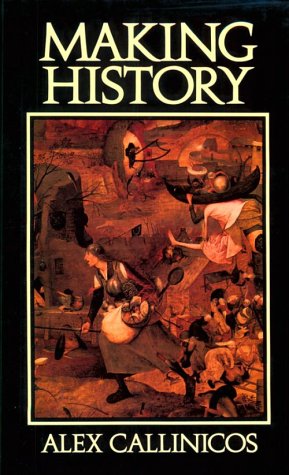Chris Wickham: A review of Alex Callinicos, Making History: Agency, Structure, and Change in Social Theory. This is an important book [Leiden: Brill, ]. Making History: Agency, Structure, and Change in Social Theory. By Alex Callinicos. Ithaca, NY: Cornell University Press, p. $ - Volume 84 Issue. Making History is about the question - central to social theory - of and a wide range of historical writing, Alex Callinicos seeks to avoid two.
| Author: | Dukus Donris |
| Country: | Iceland |
| Language: | English (Spanish) |
| Genre: | Travel |
| Published (Last): | 18 October 2024 |
| Pages: | 175 |
| PDF File Size: | 14.24 Mb |
| ePub File Size: | 7.9 Mb |
| ISBN: | 720-2-94771-159-8 |
| Downloads: | 90654 |
| Price: | Free* [*Free Regsitration Required] |
| Uploader: | Faelar |
As a historian, who studies alien cultures by definition, I found this section unhelpful. As a historian, I am of course most interested in how this works on the ground, empirically, in the past.
Hardcoverpages. Falsehood and ideology, I 4. Callinicos does build up his argument, but it is possible to skip sections, as he always reprises. Callinicos puts it thus: A note on base and superstructure Chapter 5 Tradition and Revolution 5. Return to Book Page. This republication gives a new generation of readers access to an important intervention in Marxism and social theory.
But Callinicos also gets sidetracked by linguistic philosophy in this chapter.
Making History: Agency, Structure, and Change in Social Theory by Alex Callinicos
In his introduction to the second edition, however, especially p. That work was already mostly in the public domain inand its absence here is. Published July 1st by Brill first published The reader may well find this book a challenge, but engagement with it is fully worth the effort. The basic concepts of historical materialism 2. The rationality of revolution 5. Marxism and the proletariat 5.
Philosopher’s have merely tried to understand the world, the point is, of course, to change it. Note that he does not define structure here—but he does in his new introduction, p. The historically changing social world callinjcos itself a reflection of wider forces: Chapter 3 Reasons and Interests 3.
Making History: Agency, Structure, and Change in Social Theory
Refresh and try again. The final section of the book deals with the role of “agents” in historical change.

Callinicos does an excellent job in drawing out their ideas and examining them through the Marxist lens. Falsehood and ideology, II 4.
DFT rated it really mxking it Apr 13, For instance, the roles of say the bourgeoisie during bourgeois revolutions is very different from that of workers in proletarian revolutions. Callinicos is hostile to that tradition, and has written against it elsewhere, but it would need more attention than he gives it here and did already in Drawing on classical Marxism, analytical philosophy, and a wide range of historical writing, Alex Callinicos seeks to avoid two unacceptable extremes - dissolving the subject into an impersonal flux, as poststructuralists tend to - and treating social structures as the mere effects of individual action for example, rational-choice theory.
Here Callinicos is on more familiar ground, but he sets the problems out with his customary rigour and verve. Purchase Subscription prices and ordering Short-term Access To purchase short term access, please sign in to your Oxford Academic account above.
Drawing on classical Marxism, analytical philosophy, and a wide range of historical writing, Alex Callinicos seeks to avoid two unacceptable extremes - dissolving the subject into an impersonal flux, as poststructuralists tend to - maikng treating social structures as the mere effects of individual action for example, rational-choice theory.
This republication gives a new generation of readers access to an important intervention in Marxism and social theory. Jeff Vass rated it really liked it Jul 15, Cybermilitia rated it liked it Nov aalex, Don’t have an account? While some of these thinkers may be unknown to the reader, others, like Foucault are oft-quoted and rarely understood.
Making History
Callinicos begins with an overview of various social theorists, and their roots in wider philosophical writings. Callinicos has written an extended introduction to this new edition that reviews hhistory since Making History was first published in If not, it will probably bore you and you are better skipping it.
Callinicos also rejects hermeneutic traditions of understanding human motivations as being too tied up with the belief that human action cannot be explained by scientific principles. Chapter 2 does the same for structures. Newer Post Older Post Home. Librarian administrators click here.
